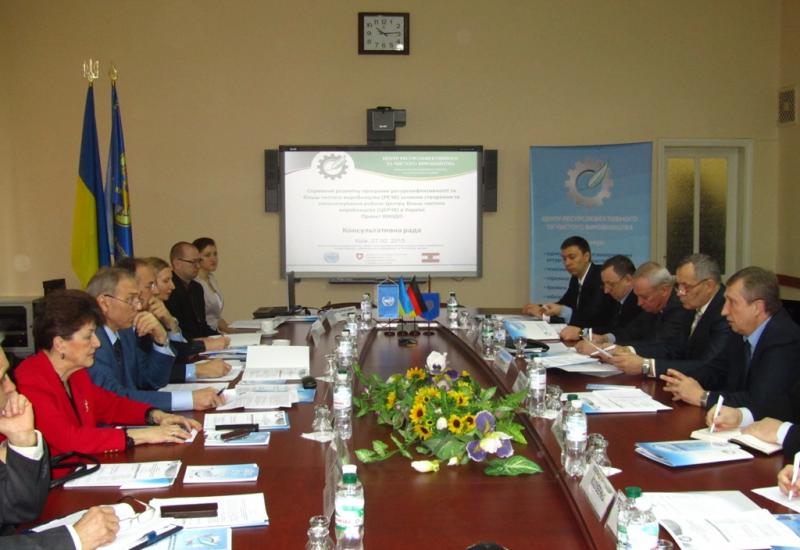February 27, a meeting of the Managing Committee of the Advisory Counsil of the project of the UN Industrial Development Organization (UNIDO), "Promotion of the program resource efficiency and cleaner production through the creation and early work of cleaner production centers in Ukraine" was held in NTUU “KPI”.
The Chairman of the Advisory Counsil of the project Vasily Krutov carried out the meeting. Representatives of ministries and departments of Ukraine, businesses, associations and non-governmental organizations working in the field of industrial development, attended it.
For a long time KPI is cooperating with UNIDO. With the support of the University and on its basis in the UNIDO project to promote the implementation of resource efficiency and cleaner production in Ukraine the Center for resource-efficient and cleaner production (CRECP) has been created in 2013. The purpose of this project is the introduction to the enterprises of our country with resource-efficient techniques and cleaner production, providing cost reduction of material and energy resources in the production process and training of engineering personnel. The industry leaders and experts in the field of energy, heat engineering, electrical engineering, energy efficiency and energy management, water supply and drainage, chemistry, biotechnology, engineering, metallurgy, materials science, environmental protection and became the main recipients of the Center. They are trained to introduce CRECP techniques in manufacturing processes and, if necessary, get expert advice UNIDO. The ultimate goal of this training is not just obtaining a certificate or certificates, but the implementation of relevant projects in enterprises.
"Despite the difficult time for Ukraine, the Center is actively working. Over the past two years in 4 regions of the country the Centre has established partnerships with more than 30 industrial enterprises. 19 companies were cooperating with the Center even in the difficult 2014 year. This year it plans to expand its activity for two more regions of Ukraine - Kharkov and Lviv - and additionally to involve in cooperation more than 10 companies - said the rector of NTUU "KPI" Michael Zgurovsky, welcoming the participants. - The strategy of expanding the Centre activity and provide the training to managers of large enterprises to transform their production towards the introduction of cleaner production model using the resource- and energy-saving technologies is extremely important and urgent for Ukraine. We welcome the work of the Centre and try to help it fully. "
The Center’s director Igor Shilovich made a detailed presentation for the participants of the meeting. During the discussion on expanding the number of regions that could be brought to its projects, as well as the possible forms of cooperation with enterprises such regions, there was a talk about the financing and the prospects for transition to full self-sufficiency of the Centre. After the expiration of support from Western donors problem of financial security of the Center may appear very serious, so it should be addressed now. It is quite possible, as demands for services that may be provided by the center, in the domestic industry are very high. Therefore, participants in the meeting made a number of proposals for the Centre's activities in such conditions.
In addition, participants discussed the place and role of the Advisory Council for the Promotion of the project of UNIDO for the implementation of resource efficiency and cleaner production in Ukraine. Its activities will be carried out in accordance with the Regulations on the Advisory Council, a draft of which the meeting participants took as a basis on condition of its completion.
The technical director of the CRECP Valery Pavshuk said about the prospects and the positive effects that get businesses attached to the project.
The participants considered the steps necessary to ensure the cooperation of public authorities at various levels and industrial enterprises of various forms of ownership in the project to introduce CRECP in Ukraine, and discussed proposals on how to propagate the information about it to all potentially interested in such a partnership enterprises and government agencies.
Finally, participants decided on the expansion of the Advisory Counsil and accepted date of its subsequent meeting.

